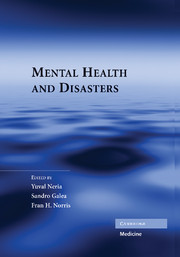Book contents
- Mental Health and Disasters
- Dedication
- Mental Health and Disasters
- Copyright page
- Contents
- Acknowledgments
- Contributors
- 1 Disaster Mental Health Research:
- Part One Concepts
- Part Two Psychopathology After Disasters
- Part Three Vulnerability And Resilience
- Part Four Special Groups
- Part Five Interventions And Health Services
- Part Six Case Studies
- Part Seven Questions and Directions
- 34 Methodological Challenges in Studying the Mental Health Consequences of Disasters
- 35 Disaster Mental Health Research:
- Index
35 - Disaster Mental Health Research:
Current State, Gaps in Knowledge, and Future Directions
from Part Seven - Questions and Directions
Published online by Cambridge University Press: 07 May 2010
- Mental Health and Disasters
- Dedication
- Mental Health and Disasters
- Copyright page
- Contents
- Acknowledgments
- Contributors
- 1 Disaster Mental Health Research:
- Part One Concepts
- Part Two Psychopathology After Disasters
- Part Three Vulnerability And Resilience
- Part Four Special Groups
- Part Five Interventions And Health Services
- Part Six Case Studies
- Part Seven Questions and Directions
- 34 Methodological Challenges in Studying the Mental Health Consequences of Disasters
- 35 Disaster Mental Health Research:
- Index
Summary
Keywords
- Type
- Chapter
- Information
- Mental Health and Disasters , pp. 594 - 610Publisher: Cambridge University PressPrint publication year: 2009
- 15
- Cited by



